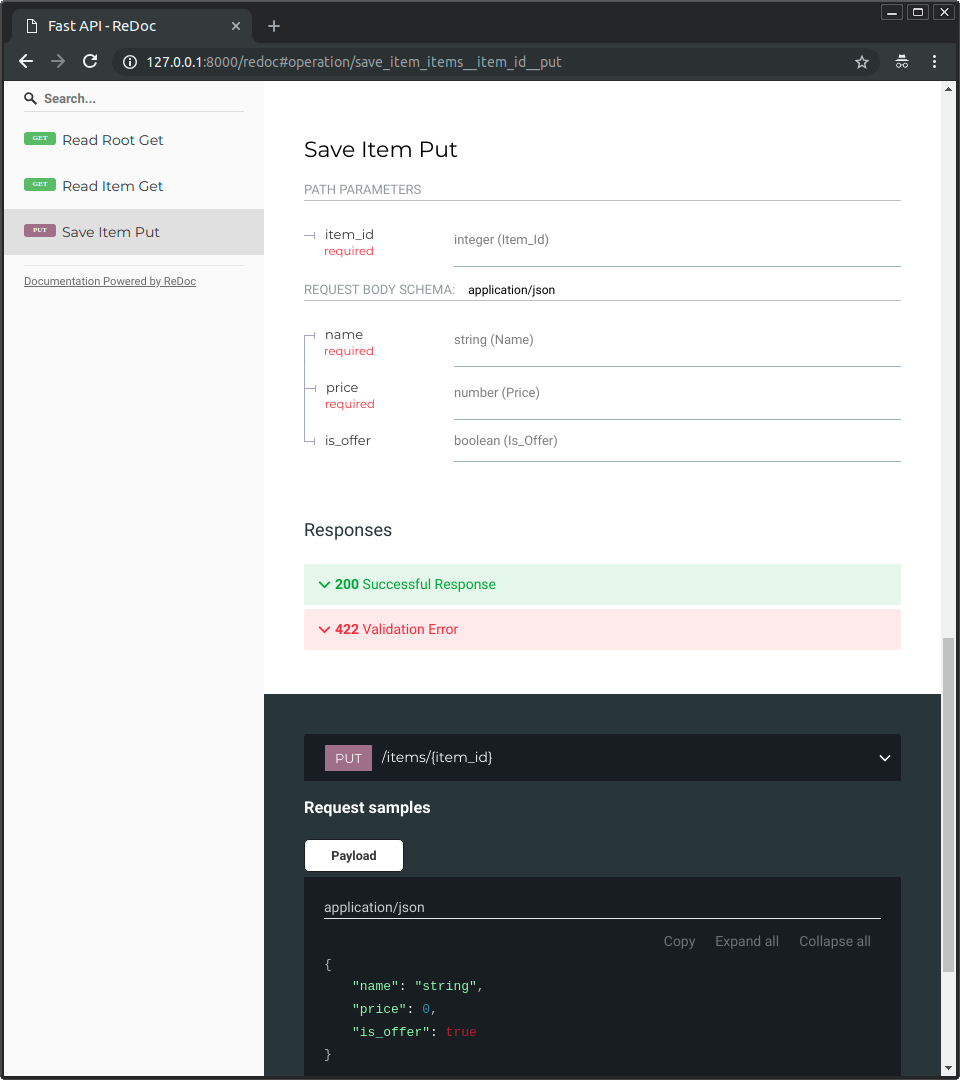- Sort Score
- Result 10 results
- Languages All
Results 51 - 60 of 87 for Must (0.26 sec)
-
tests/test_tutorial/test_body_fields/test_tutorial001.py
Python - Registered: Sun Apr 28 07:19:10 GMT 2024 - Last Modified: Thu Apr 18 19:40:57 GMT 2024 - 7.2K bytes - Viewed (0) -
tests/test_tutorial/test_body_fields/test_tutorial001_py310.py
Python - Registered: Sun Apr 28 07:19:10 GMT 2024 - Last Modified: Thu Apr 18 19:40:57 GMT 2024 - 7.3K bytes - Viewed (0) -
docs/en/docs/tutorial/path-params-numeric-validations.md
Number validations also work for `float` values. Here's where it becomes important to be able to declare <abbr title="greater than"><code>gt</code></abbr> and not just <abbr title="greater than or equal"><code>ge</code></abbr>. As with it you can require, for example, that a value must be greater than `0`, even if it is less than `1`. So, `0.5` would be a valid value. But `0.0` or `0` would not.
Plain Text - Registered: Sun May 05 07:19:11 GMT 2024 - Last Modified: Thu Jan 11 16:31:18 GMT 2024 - 9.1K bytes - Viewed (0) -
docs/en/docs/advanced/openapi-callbacks.md
Plain Text - Registered: Sun May 05 07:19:11 GMT 2024 - Last Modified: Thu May 02 22:37:31 GMT 2024 - 7.7K bytes - Viewed (0) -
docs/en/docs/features.md
 ### Just Modern Python It's all based on standard **Python type** declarations (thanks to Pydantic). No new syntax to learn. Just standard modern Python.
Plain Text - Registered: Sun May 05 07:19:11 GMT 2024 - Last Modified: Thu May 02 22:37:31 GMT 2024 - 9.3K bytes - Viewed (0) -
docs/en/docs/advanced/openapi-webhooks.md
!!! info The `app.webhooks` object is actually just an `APIRouter`, the same type you would use when structuring your app with multiple files.Plain Text - Registered: Sun May 05 07:19:11 GMT 2024 - Last Modified: Thu May 02 22:37:31 GMT 2024 - 2.8K bytes - Viewed (0) -
docs/en/docs/tutorial/dependencies/sub-dependencies.md
Prefer to use the `Annotated` version if possible. ```Python hl_lines="8-9" {!> ../../../docs_src/dependencies/tutorial005.py!} ``` It declares an optional query parameter `q` as a `str`, and then it just returns it. This is quite simple (not very useful), but will help us focus on how the sub-dependencies work. ## Second dependency, "dependable" and "dependant"Plain Text - Registered: Sun May 05 07:19:11 GMT 2024 - Last Modified: Tue Oct 17 05:59:11 GMT 2023 - 5.6K bytes - Viewed (0) -
docs/en/docs/tutorial/path-operation-configuration.md
You could also use `from starlette import status`. **FastAPI** provides the same `starlette.status` as `fastapi.status` just as a convenience for you, the developer. But it comes directly from Starlette. ## Tags You can add tags to your *path operation*, pass the parameter `tags` with a `list` of `str` (commonly just one `str`): === "Python 3.10+" ```Python hl_lines="15 20 25"Plain Text - Registered: Sun May 05 07:19:11 GMT 2024 - Last Modified: Tue Oct 17 05:59:11 GMT 2023 - 5.5K bytes - Viewed (0) -
docs/en/docs/tutorial/query-params.md
When you declare a default value for non-path parameters (for now, we have only seen query parameters), then it is not required. If you don't want to add a specific value but just make it optional, set the default as `None`. But when you want to make a query parameter required, you can just not declare any default value: ```Python hl_lines="6-7" {!../../../docs_src/query_params/tutorial005.py!} ```
Plain Text - Registered: Sun May 05 07:19:11 GMT 2024 - Last Modified: Fri Oct 20 09:08:42 GMT 2023 - 5.1K bytes - Viewed (0) -
tests/test_tutorial/test_openapi_callbacks/test_tutorial001.py
) assert response.status_code == 200, response.text assert response.json() == {"msg": "Invoice received"} def test_dummy_callback(): # Just for coverage invoice_notification({}) def test_openapi_schema(): response = client.get("/openapi.json") assert response.status_code == 200, response.text assert response.json() == {Python - Registered: Sun Apr 28 07:19:10 GMT 2024 - Last Modified: Fri Jul 07 17:12:13 GMT 2023 - 9K bytes - Viewed (0)